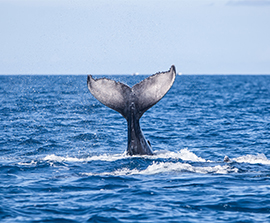| Home |
| Water System |
| Sewer System |
| Harbor and Bay |
| School Program |
| About MWRA |
| Doing Business with MWRA |
| Contact MWRA |
Boston Harbor
and Massachusetts Bay
Massachusetts
Water Resources Authority
| What's New | Regulatory Reporting | Archive |
Ambient Monitoring
 |
MWRA monitors water quality at the outfall location in Massachusetts Bay where treated sewage, or effluent, is discharged. This program involves sampling the waters surrounding the outfall, as well as more distant locations. The program is detailed in the Ambient Monitoring Plan, which is attached to MWRA's NPDES discharge permit. The Plan is monitored by state and federal regulators, as well as by the Outfall Monitoring Science Advisory Panel (OMSAP). |
The NPDES permit allows MWRA to propose interim modifications to the Ambient Monitoring Plan at any time.
Monthly Bacteria Monitoring at the Outfall
Recent measure of sewage indicator bacteria, fecal coliform and Enterococcus,
around the outfall and elsewhere in Massachusetts Bay.
Quarterly Ambient Monitoring
Report
The results of all monitoring required by the ambient monitoring plan
or the Bays
Eutrophication Model must be reported quarterly to regulators, OMSAP,
and the National Marine Fisheries Service.
Contingency Plan Quarterly Report
on Ambient Monitoring
Data on mussel contamination, dissolved oxygen, and algae at sampling
locations in Massachusetts Bay, compared with threshold limits in MWRA's Contingency
Plan.
Ambient monitoring plan for the Massachusetts Water Resources Authority effluent outfall revision 2. July 2010
Ambient
Monitoring Plan for the Massachusetts Water Resources Authority Effluent
Outfall, Revision 1, March 2004
Special
Study of Flounder Skin Lesions
In the April 2003 flounder survey, an increased number of flounder ulcers
were recorded, with the highest prevalence in Western Massachusetts Bay.
The condition was absent from Eastern Cape Cod Bay. The Outfall Monitoring
Science Advisory Panel recommended further study of this condition. MWRA
designed a study to further investigate the possible causes of these ulcers.